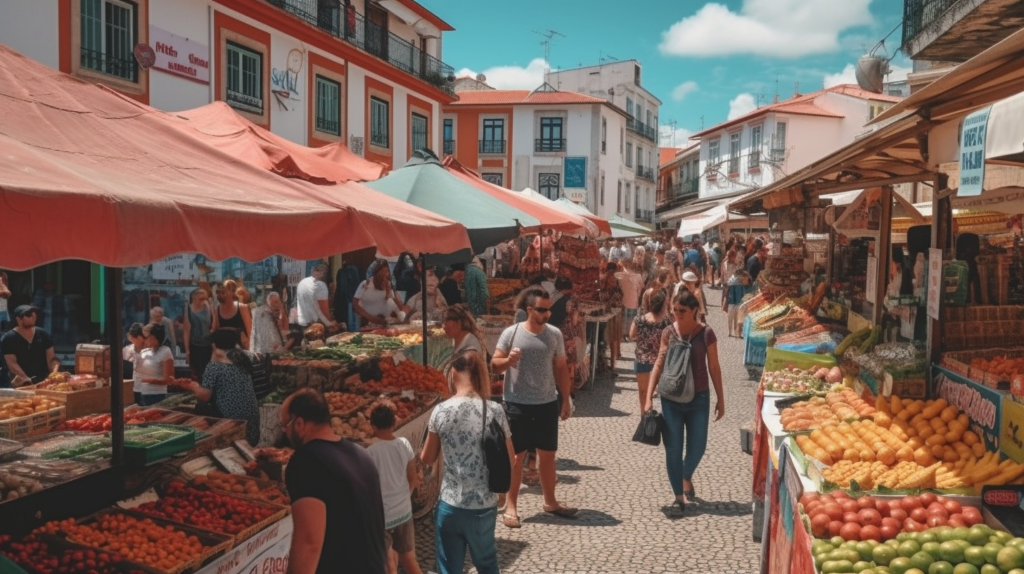
Tasting Portugal: A Culinary Journey through Local Markets and Kitchen Secrets
Welcome to Portugal, where every meal is a celebration of flavors, history, and tradition. Embark on a culinary journey through the bustling local markets and uncover the secrets of Portuguese kitchens that have been passed down through generations.
Introduction
Portugal is a paradise for food enthusiasts, offering a diverse array of fresh produce, aromatic spices, and mouthwatering dishes. In this article, we’ll delve into the heart of Portuguese cuisine, exploring the vibrant markets, traditional recipes, and innovative culinary scene that make this country a gastronomic delight.
1. Exploring Local Markets

1.1 Variety of Produce
Portuguese markets are a feast for the senses, with stalls overflowing with colorful fruits, vegetables, and freshly caught seafood. From juicy oranges from the Algarve to plump tomatoes from the Douro Valley, these markets showcase the best of Portugal’s agricultural bounty.
1.2 Market Culture
The markets in Portugal are not just places to buy groceries; they are vibrant hubs of social activity. Locals gather to chat with vendors, sample artisanal cheeses, and savor freshly baked bread. The market culture reflects the warmth and hospitality of the Portuguese people, making it a must-visit for any food lover.
2. Unveiling Kitchen Secrets
Step into a traditional Portuguese kitchen, and you’ll discover a treasure trove of culinary secrets passed down through generations.
2.1 Traditional Dishes
Portuguese cuisine is steeped in tradition, with dishes like bacalhau (salted cod), caldo verde (green soup), and pasteis de nata (custard tarts) holding a special place in the hearts of locals. These recipes have been perfected over centuries, using simple ingredients to create unforgettable flavors.
2.2 Cooking Techniques
Portuguese chefs have mastered the art of slow cooking, using techniques like braising, roasting, and stewing to coax maximum flavor from their ingredients. Whether it’s tender octopus simmered in olive oil or succulent pork marinated in wine, the techniques used in Portuguese kitchens elevate every dish to new heights.

3. Flavors of Portugal
Portuguese cuisine is a delightful blend of sweet, savory, and spicy flavors, influenced by the country’s rich history and diverse culinary traditions.
3.1 Sweet and Savory Delights
One of the hallmarks of Portuguese cuisine is its ability to balance sweet and savory flavors in perfect harmony. Dishes like francesinha (a hearty sandwich smothered in sauce) and arroz doce (creamy rice pudding) exemplify this balance, tantalizing the taste buds with every bite.
3.2 Influence of Mediterranean Cuisine
Portugal’s location on the Iberian Peninsula has exposed it to a myriad of culinary influences, with Mediterranean flavors playing a prominent role in its cuisine. Olive oil, garlic, and fresh herbs are staples in Portuguese cooking, infusing dishes with the sunny flavors of the Mediterranean.
4. Wine and Beyond
No culinary journey through Portugal would be complete without indulging in its world-class wines and other beverages.
4.1 Wine Regions
Portugal boasts a diverse range of wine regions, each producing unique varieties that reflect the terroir of the land. From the lush vineyards of the Douro Valley to the sun-soaked slopes of the Alentejo, Portugal’s wine regions offer a tasting experience like no other.
4.2 Port Wine
No discussion of Portuguese wine would be complete without mentioning port, the country’s most famous export. Produced exclusively in the Douro Valley, port wine is known for its rich, complex flavors and velvety texture, making it the perfect accompaniment to a decadent dessert or a fine cheese platter.

5. Fusion and Innovation
While tradition is deeply ingrained in Portuguese cuisine, the country’s culinary scene is also a hotbed of innovation and experimentation.
5.1 Fusion Cuisine
Portuguese chefs are not afraid to push the boundaries of tradition, incorporating global flavors and techniques into their cooking. The result is a vibrant fusion cuisine that delights diners with unexpected combinations and bold flavors.
5.2 Michelin-Starred Restaurants
Portugal’s culinary prowess has not gone unnoticed on the international stage, with several Michelin-starred restaurants earning accolades for their innovative menus and impeccable service. From Lisbon to Porto, these gastronomic temples offer a taste of Portugal’s finest cuisine in an elegant and refined setting.
Conclusion
From the bustling markets to the innovative kitchens of its finest restaurants, Portugal offers a culinary experience like no other. Whether you’re savoring a traditional dish passed down through generations or indulging in a modern interpretation of Portuguese cuisine, every bite tells a story of history, culture, and tradition. So why wait? Come taste Portugal for yourself and embark on a culinary journey you’ll never forget.
FAQs (Frequently Asked Questions)
1. What are some must-try dishes in Portuguese cuisine? Portuguese cuisine offers a diverse range of dishes, but some must-try classics include bacalhau, caldo verde, and pasteis de nata.
2. Which regions in Portugal are known for their wine production? Portugal is home to several wine regions, including the Douro Valley, Alentejo, and Vinho Verde, each known for producing unique and flavorful wines.
3. What is the best time to visit Portuguese markets? The best time to visit Portuguese markets is in the morning when they are bustling with activity and the freshest produce is available.
4. Is Portuguese cuisine spicy? While Portuguese cuisine does incorporate some spices, it is generally not known for being overly spicy. Instead, it focuses on fresh ingredients and balanced flavors.
5. Are there vegetarian options available in Portuguese cuisine? Yes, there are plenty of vegetarian options available in Portuguese cuisine, including hearty soups, grilled vegetables, and delicious salads.

